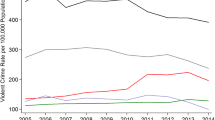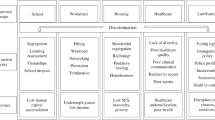Abstract
This paper demonstrates how ubuntu relational philosophy may be used to ground beneficial coercive care without necessarily violating a patient’s dignity. Specifically, it argues that ubuntu philosophy is a useful theory for developing necessary conditions for determining a patient’s potential dangerousness; setting reasonable limits to the duty to protect; balancing the long-term good of providing unimpeded therapy for patients who need it with the short-term good of protecting at-risk parties; and advancing a framework for future case law and appropriate regulations in the care of psychotherapy patients. Issues regarding the decision to breach medical confidentiality in psychotherapeutic care are ultimately reserved for the courts. Professional assessment might be an important first step in this process, and court rulings govern most aspects of this assessment. However, current case law, especially in the United States, places an unreasonable expectation on psychotherapists to protect all at-risk parties or foresee that a patient intends to follow through on said threats. It has largely failed to guarantee psychotherapy patients unlimited access to care, while potentially inhibiting future honest communication between patients and health professionals and endangering the safety of others. Of these decisions, the two most prominent are the 1976 Tarasoff decision and the 2016 Volk decision. This paper argues for the possibility of grounding good laws in ubuntu African philosophy in a way that protects others from harm and ensures unimpeded access to care without necessarily breaching medical confidentiality.
Similar content being viewed by others
Notes
In referring to a capability approach, I am drawing on the normative conceptual framework canvassed by Amartya Sen and developed by Martha Nussbaum, which prioritizes people’s opportunities and abilities to realize various activities and states of being (functioning) in evaluating individual well-being, social arrangements, and policy proposals; see, e.g., [40, 41] and generally [42].
However, ubuntu is also distinct from Kantianism, which describes right actions as those that enhance an individual’s capacity and independence, and from consequentialism, which defines right actions as those that promote good consequences. Unlike Kantianism, the normative theory here defines actions as right insofar as they connect, rather than separate, individuals in communal relationships where they identify and exhibit solidarity with one another.
References
Persaud, Albert, and David Hewitt. 2001. European convention on human rights: Effects on psychiatric care. Nursing Standard 15(44): 33–37.
Jaffee v. Redmond, 518 U.S. 1 (1996).
Health Insurance Portability and Accountability Act of 1996 (HIPAA), Pub.L. No. 104–191, 110 Stat. 1936 (1996).
45 C.F.R. § 164.512 (2016).
Bersoff, Donald N. 2014. Protecting victims of violent patients while protecting confidentiality. American Psychologist 69: 461–467.
Tarasoff v. Regents of the University of California, 17 Cal. 3d 425 (1976), 551 P.2d 334, 131 Cal. Rptr. 14 (1976).
Cal. Civ. Code § 43.92 (2013).
American Psychological Association. 1953. Ethical standards of psychologists: A summary of ethical principles. Washington, DC: American Psychological Association.
Boynton v. Burglass, 590 So. 2d 446 (Fla. Dist. Ct. App. 1991).
Agyapong, V.I.O., R. Kirrane, and R. Bangaru. 2009. Medical confidentiality versus disclosure: Ethical and legal dilemmas. Journal of Forensic and Legal Medicine 16: 93–96.
Osman v. United Kingdom, 1998-VIII Eur. Ct. H.R. 3124.
Kadooka, Yasuhiro, Taketoshi Okita, and Atsushi Asai. 2016. Ethical obligations in the face of dilemmas concerning patient privacy and public interests: The Sasebo schoolgirl murder case. Bioethics 30: 520–527.
Knoll, James L. 2015. The psychiatrist’s duty to protect. CNS Spectrums 20: 215–222.
Elger, Bernice Simone, Violet Handtke, and Tenzin Wangmo. 2015. Paternalistic breaches of confidentiality in prison: Mental health professionals’ attitudes and justifications. Journal of Medical Ethics 41: 496–500.
Anfang, Stuart A., and Paul S. Appelbaum. 1996. Twenty years after Tarasoff: Reviewing the duty to protect. Harvard Review of Psychiatry 4: 67–76.
Monahan, John, Henry J. Steadman, Eric Silver, Paul S. Appelbaum, Pamela Clark Robbins, Edward P. Mulvey, Loren H. Roth, Thomas Grisso, and Steven Banks. 2001. Rethinking risk assessment: The MacArthur study of mental disorder and violence. Oxford: Oxford University Press.
Bardoni v. Kim, 390 N.W.2d 218 (Mich. App. 1986).
Lipari v. Sears, Roebuck and Co., 497 F. Supp. 185, 190 (D. Neb. 1980).
Volk v. DeMeerleer, 386 P.3d 254 (Wash. 2016).
Piel, Jennifer L., and Rejoice Opara. 2018. Does Volk v DeMeerleer conflict with the AMA Code of Medical Ethics on breaching patient confidentiality to protect third parties? AMA Journal of Ethics 20: 10–18.
Boron Oil Co. v. Downie, 873 F.2d 67 (4th Cir. 1989).
Kipnis, Kenneth. 2007. Medical confidentiality. In The Blackwell guide to medical ethics, ed. Rosamond Rhodes, Leslie P. Francis, and Anita Silvers, 104–127. Malden, MA: Blackwell.
Ewuoso, Cornelius Olukunle. 2018. Beneficial coercion in psychiatric care: Insights from African ethico-cultural system. Developing World Bioethics 18: 91–97.
Caplan, Arthur. 2008. Denying autonomy in order to create it: The paradox of forcing treatment upon addicts. Addiction 103: 1919–1921.
Stone, Alan A. 1975. Mental health and law: A system in transition. Rockville, MD: National Institute of Mental Health.
Ewuoso, C., and S. Hall. 2019. Core aspects of ubuntu: A systematic review. South African Journal of Bioethics and Law 12: 93–103.
Ndebele, Paul, Joseph Mfutso-Bengo, and Francis Masiye. 2008. HIV/AIDS reduces the relevance of the principle of individual medical confidentiality among the Bantu people of Southern Africa. Theoretical Medicine and Bioethics 29: 331–340.
Nurse, Derek. 2006. Bantu languages. In Encyclopedia of language and linguistics, 2nd ed, ed. Keith Brown, vol. 1, 679–685. Oxford: Elsevier.
Metz, Thaddeus. 2007. Toward an African moral theory. Journal of Political Philosophy 15: 321–341.
Tutu, Desmond. 1999. No future without forgiveness. London: Random House.
Ramose, Mogobe B. 2002. The philosophy of ubuntu and ubuntu as a philosophy. In Philosophy from Africa: A text with readings, ed. P.H. Coetzee and A.P.J. Roux, 230–237. Oxford: Oxford University Press.
Gade, Christian B.N. 2012. What is ubuntu? Different interpretations among South Africans of African descent. South African Journal of Philosophy 31: 484–503.
Mfutso-Bengo, Joseph, and Francis Masiye. 2011. Toward an African Ubuntuology/uMunthuology: Bioethics in Malawi in the context of globalization. In Bioethics around the globe, ed. Catherine Myser, 134–151. Oxford: Oxford University Press.
Dreyer, Jaco S. 2015. Ubuntu: A practical theological perspective. International Journal of Practical Theology 19: 189–209.
Metz, Thaddeus. 2012. An African theory of moral status: A relational alternative to individualism and holism. Ethical Theory and Moral Practice 15: 387–402.
Metz, Thaddeus. 2010. Human dignity, capital punishment, and an African moral theory: Toward a new philosophy of human rights. Journal of Human Rights 9: 81–99.
Gilligan, Carol. 1982. In a different voice. Cambridge: Harvard University Press.
Gavaghan, Colin. 2007. A Tarasoff for Europe? A European Human Rights perspective on the duty to protect. International Journal of Law and Psychiatry 30: 255–267.
Gellerman, David M., and Robert Suddath. 2005. Violent fantasy, dangerousness, and the duty to warn and protect. Journal of the American Academy of Psychiatry and the Law 33: 484–495.
Sen, Amartya. 1992. Inequality reexamined. Cambridge: Harvard University Press.
Nussbaum, Martha C. 2011. Creating capabilities: The human development approach. Cambridge: Belknap Press.
Robeyns, Ingrid, and Morten Fibieger Byskov. 2021. The capability approach. In The Stanford Encyclopedia of Philosophy, Fall 2021 ed, ed. Edward N. Zalta. Stanford: Metaphysics Research Lab. https://plato.stanford.edu/archives/fall2021/entries/capability-approach.
Hoffmann, Nimi, and Thaddeus Metz. 2017. What can the capabilities approach learn from an ubuntu ethic? A relational approach to development theory. World Development 97: 153–164.
Kant, Immanuel. 1785. Grundlegung zur Metaphysik der Sitten. Riga: Hartknoch.
Dolamo, Ramathate. 2013. Botho/Ubuntu: The heart of African ethics. Scriptura 112: 1–10. https://doi.org/10.7833/112-0-781-10.
Metz, Thaddeus. 2011. Ubuntu as a moral theory and human rights in South Africa. African Human Rights Law Journal 11: 532–559.
Bloch, Sidney, and Peter Reddaway. 1977. Russia’s political hospitals: The abuse of psychiatry in the Soviet Union. London: Victor Gollancz.
Van Voren, Robert. 2010. Abuse of psychiatry for political purposes in the USSR: A case-study and personal account of the efforts to bring them to an end. In Ethics in psychiatry: European contributions, ed. Hanfried Helmchen and Norman Sartorius, 489–508. Dordrecht: Springer. https://doi.org/10.1007/978-90-481-8721-8_29.
Tims, Frank M., Nancy Jainchill, and George De Leon. 1994. Therapeutic communities and treatment research. In Therapeutic community: Advances in research and application, ed. Frank M. Tims, George De Leon, and Nancy Jainchill, 1–15. Rockville, MD: National Institute on Drug Abuse.
Acknowledgements
I am grateful to the anonymous reviewers for their comments and useful suggestions for improving this article. I am equally grateful to Katelyn MacDougald for revising this article and providing broad editorial assistance. Finally, I am grateful to Prof. Thaddeus Metz for reviewing and providing critical feedback on an earlier draft of this manuscript.
Author information
Authors and Affiliations
Corresponding author
Additional information
Publisher's Note
Springer Nature remains neutral with regard to jurisdictional claims in published maps and institutional affiliations.
Rights and permissions
About this article
Cite this article
Ewuoso, C. Patient confidentiality, the duty to protect, and psychotherapeutic care: perspectives from the philosophy of ubuntu. Theor Med Bioeth 42, 41–59 (2021). https://doi.org/10.1007/s11017-021-09545-0
Accepted:
Published:
Issue Date:
DOI: https://doi.org/10.1007/s11017-021-09545-0




